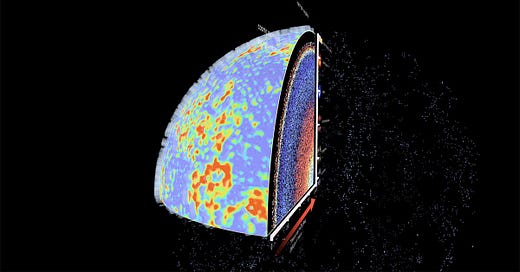your science briefing for 04.24.2025
The biggest structure in the universe turns out to be even bigger than we thought, the dangers of rising humidity, how easy it is to jailbreak chatbots, and more...
According to the cosmological principle, no place in the universe is fundamentally all that different from another on a scale of a hew hundred million light years. And yet, on top of all the challenges we’re having understanding the shape of the universe, how it moves, and whether it spins, we keep on finding giant objects that seem to challenge that principle at first blush. One of them is the Hercules-Corona Borealis Great Wall, a supercluster of galaxies that, according to a recent survey of gamma ray bursts, is far larger than we thought: a staggering 10 billion light years across, 7.2 billion light years wide, a billion light years deep, and 10 billion light years away… (Space.com)
Insects are a very important part of the ecosystem. They form a big part of the food chain as a lot of smaller predators and omnivores regularly eat them. They also play critical role in pollination by carrying pollen much farther and to much better places than wind alone. Unfortunately, their populations are collapsing. Why? Well, there is no one clear answer. Modern agriculture and overuse of pesticides are one frequent reason, but it’s far from the only one, and any long term solutions will involve solving for many industrial, chemical, and environmental factors… (Bing U)
Earth is getting hotter, hot enough for us to worry about large stretches of the planet becoming uninhabitable by humans and massive refugee crises. But believe it or not, that’s not all we have to keep in mind. It’s not just the constant heat and droughts that will pose immense challenges to livability. Our bodies cool themselves by sweating as the heat is carried away from the skin by evaporation. When it’s humid, only so much water vapor can be absorbed into the air so sweat evaporates slower, meaning that in humid conditions, we overheat much faster than we’d think. Which is a big concern as large regions are on their way to becoming fatally hot and humid… (PNAS)
LLM powered chatbots like ChatGPT, Claude, and various companion AIs are very big calculators that can computer relationships between words in a language and predict the next word that should appear in a meaningful response. This is what they’re really good at doing. What they’re a lot less good at doing is knowing what data fed to them is a secret, or dangerous to share, or what rules they’re actually bound by, so if you’re patient enough, you can figure out a lot of creative ways to break them, making them disclose or do things they’re ostensibly not supposed to do… (PsyPost)
Do you get your science news from newsletters like this? Congratulations, you’re the majority of the public today. Most people are learning about the latest science, tech, and related news from “non-traditional media sources” instead of mainstream legacy news. But these sources run the gamut from newsletters carefully research and fact check data before posting and correct mistakes when they happen — which is what I try my best to do — to conspiracy theorists in it only for the clicks. This is already far from ideal, and it’s doubly bad when the majority of the public are getting information about global warming, climate change, and the state of the environment from internet randos and podcast bros… (TNR)
![[ world of weird things ]](https://substackcdn.com/image/fetch/w_80,h_80,c_fill,f_auto,q_auto:good,fl_progressive:steep,g_auto/https%3A%2F%2Fsubstack-post-media.s3.amazonaws.com%2Fpublic%2Fimages%2F93728edf-9a13-4b2b-9a33-3ef171b5c8d8_600x600.png)

![[ world of weird things ]](https://substackcdn.com/image/fetch/w_36,h_36,c_fill,f_auto,q_auto:good,fl_progressive:steep,g_auto/https%3A%2F%2Fsubstack-post-media.s3.amazonaws.com%2Fpublic%2Fimages%2F93728edf-9a13-4b2b-9a33-3ef171b5c8d8_600x600.png)

